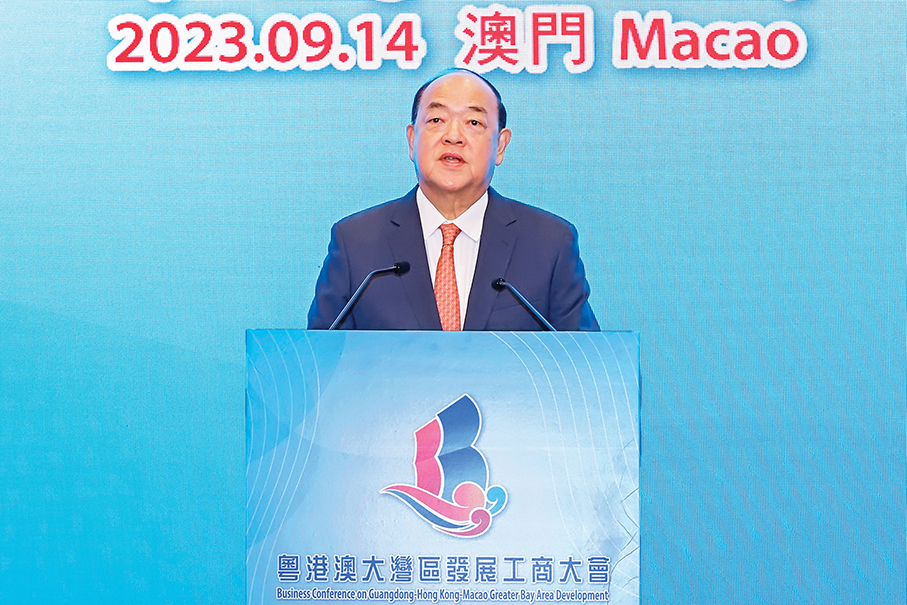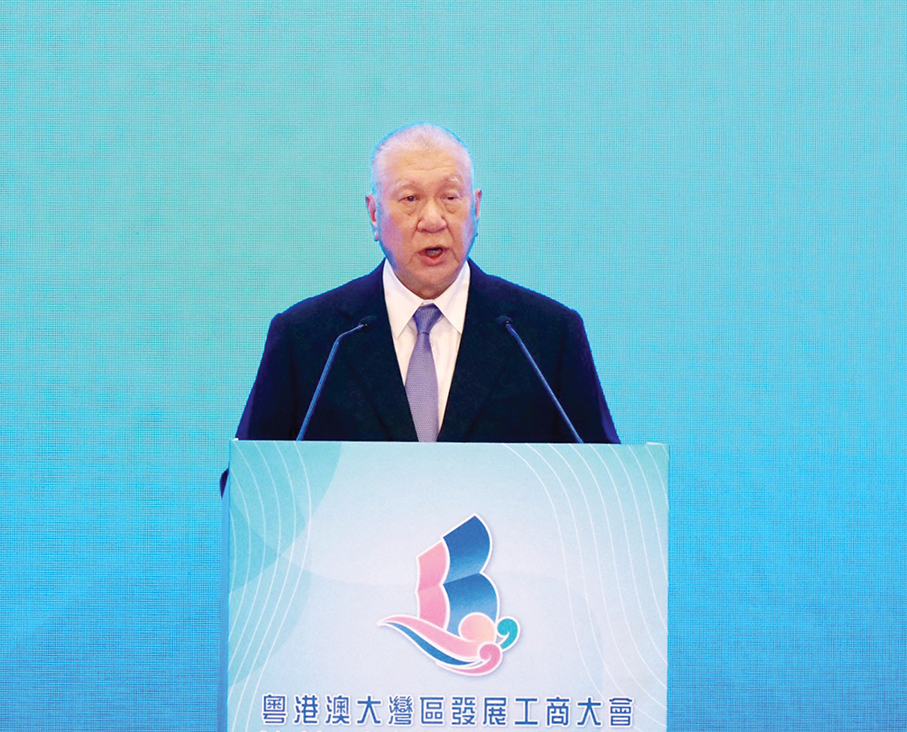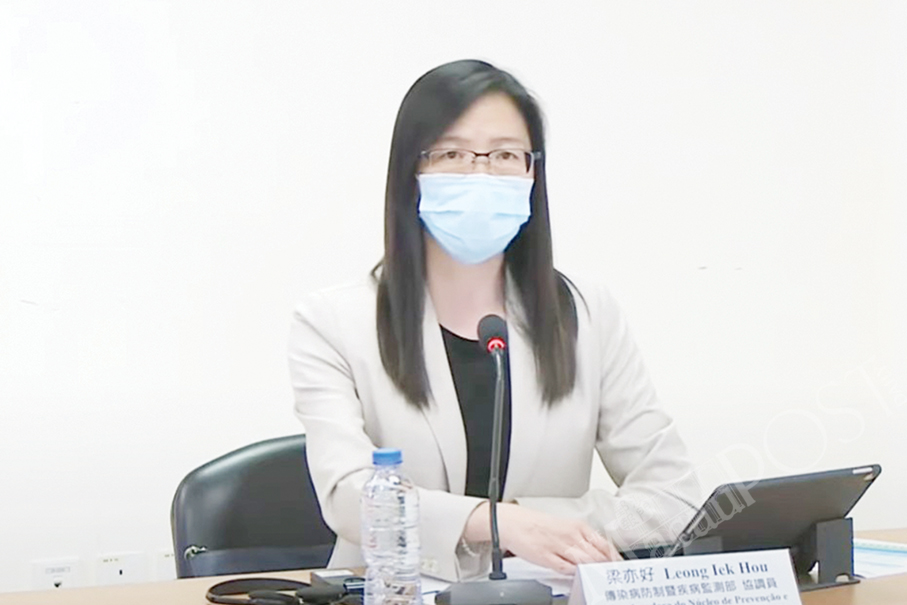Addressing the opening ceremony of the first-ever “Business Conference on Guangdong-Hong Kong-Macau Greater Bay Area Development” yesterday, Chief Executive Ho Iat Seng said that “Macau is working hard to implement the decision to position the special administrative region, in terms of its development, as “One Centre, One Platform and One Base” and pragmatically promote its appropriate economic diversification under its ‘1+4’ development strategy, enriching Macau’s industrial structure, in favour of the new development of the Guangdong-Hong Kong-Macao Greater Bay Area”.
Themed “Greater Bay Area, Farsighted Strategy, Extensive Exchange, and Great Development”, the two-day event is jointly hosted by the China Council for the Promotion of International Trade and the Guangdong, Hong Kong and Macau governments.
While promoting the formation of an “excellent, dedicated and strong” integrated tourism and leisure industry, Ho underlined, the Macau government is “vigorously” promoting the development of key industries, namely big health – traditional Chinese medicine (TCM), modern finance and high-tech, as well as conventions, exhibitions and commerce, and culture and sport, i.e., the “1+4” strategy.
The government’s “One Centre, One Platform and One Base” policy refers to its determination to further develop Macau’s role as a World Centre of Tourism and Leisure and an economic and trade cooperation platform for China and Portuguese-speaking countries as well as a cultural exchange and cooperation base.
Ho also said that Macau, one of the core cities of the Greater Bay Area (GBA), has the advantages of being an international free port, with a reduced tax burden, an extensive economic and commercial network, as well as a harmonious social environment, “proactively” playing the role of a platform for “external introduction and internal connection”.
During the ceremony, Ho encouraged the over 1,000 attendees from domestic and international political, academic and business sectors to invest, establish businesses, live and work in the GBA and thus transform the area into an “important” point of connection with the nation’s new “dual circulation” development situation: “It is an excellent place for business and living, with great market potential.”
“Dual circulation” is a central government strategy to reorientate the country’s economy by prioritising domestic consumption (“internal” or “domestic circulation”) while remaining open to international trade and investment (“external” or “international circulation”).
Ho added that the Guangdong-Macau In-depth Cooperation Zone in Hengqin is a new platform to promote the appropriate diversification of Macau’s economy, promising that the governments of Guangdong and Macau will strengthen their cooperation by continuing to improve the new system of “joint consultation, joint construction, joint management and sharing of results between Guangdong and Macau”, thereby “vigorously” promoting the high-quality development of the cooperation zone, with a view to make it a centre of attraction for development in the GBA.
The event, which kicked off yesterday morning at The Venetian Macao in Cotai, also included the participation of Chinese People’s Political Consultative Conference (CPPCC) National Committee Vice Chairman Edmund Ho Hau Wah, Central People’s Government Liaison Office in the Macau Special Administrative Region (MSAR) Director Zheng Xincong and Foreign Ministry Commissioner in Macau Liu Xianfa, as well as a video address by Hong Kong Special Administrative Region (HKSAR) Chief Executive John Lee Ka-chiu. During the opening ceremony, the China Maritime Arbitration Commission – Greater Bay Area Arbitration Centre (South China Sub-Commission) was officially inaugurated, taking cognisance of domestic and international cases involving maritime disputes.
Delivering a speech during the ceremony, Edmund Ho expressed his expectation that the Guangdong, Hong Kong and Macau governments will jointly step up institutional reform and innovation, accelerate the development and construction of major cooperation platforms such as Hengqin in Zhuhai, in order to better attract high-end factor resources from around the world and lead the all-round deepening of cooperation between the three places. Ho added that the development of the GBA under the “One Country, Two Systems” principle, involving three separate customs territories and three currencies is unprecedented in the world, which was, he pointed out, a “vivid” practice of the central government’s support for and effort to better integrate Hong Kong and Macau into the overall development of the country, providing broad scope for cooperation among the business communities of various countries, while showing the superiority of China’s system and the complementary advantages of multiple places for mutual win-win results.
Edmund Ho, the first MSAR chief executive (1999-2009), also said he hoped that relevant trade and investment promotion agencies and business associations will play the role of bridges and links, build more platforms and provide better services for enterprises from various countries to participate in the development of the GBA, while also playing a greater role in promoting the GBA’s in-depth participation in international cooperation.
Meanwhile, HKSAR Chief Executive John Lee said via video link that the GBA is bound to develop into one of the most vibrant and competitive regions in China and the world, thanks to the building of the Hetao Shenzhen-Hong Kong Science and Technology Innovation Cooperation Zone, Guangdong-Macao In-depth Cooperation Zone in Hengqin, and Qianhai Shenzhen-Hong Kong Modern Service Industry Cooperation Zone.
The Greater Bay Area comprises the two special administrative regions of Hong Kong and Macau, and the nine cities of Dongguan, Foshan, Guangzhou, Huizhou, Jiangmen, Shenzhen, Zhaoqing, Zhongshan and Zhuhai in Guangdong province, covering the total area of around 56,000 square kilometres.
According to the latest statistics provided by the governments in Hong Kong, Macau and Guangdong, the population in the GBA exceeded over 86 million at the end of last year (about the same as the population of Germany), with its gross domestic product (GDP) amounting to over 13 trillion yuan.

Chief Executive Ho Iat Seng delivers a speech during yesterday’s opening ceremony of the first-ever “Business Conference on Guangdong-Hong Kong-Macau Greater Bay Area Development” at The Venetian Macao in Cotai.
– Photo: GCS

Chinese People’s Political Consultative Conference (CPPCC) National Committee Vice Chairman Edmund Ho Hau Wah delivers a speech during yesterday’s opening ceremony of the two-day “Business Conference on Guangdong-Hong Kong-Macau Greater Bay Area Development” at The Venetian Macao in Cotai.
– Photo courtesy of TDM









